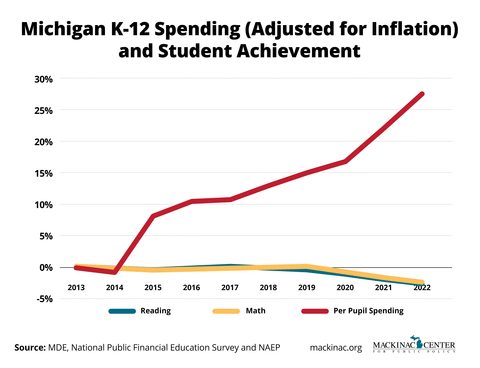Commentary
The simple truth that Michigan’s population council can’t tell
Want to make Michigan competitive? Let people keep their money and send less of it to Lansing

Michigan is not effective at delivering public services, such as K-12 education. But the people who run it want it to do more, like register homeschoolers. How does this help grow Michigan? | Shutterstock
If the state is serious about growing Michigan’s population, it would start with minimizing how much the government takes from people’s pocketbooks.
Gov. Gretchen Whitmer spent $2 million of taxpayer money on a population council to produce recommendations on growing the number of state residents. Then one of its co-chairs said the plan would not grow Michigan — and that Michigan’s population likely would not grow for another quarter century.
There’s a reason Michigan saw 15,051 people leave the state in one year, but neighboring Ohio gained 637 new residents and Indiana gained 4,599.
This area of the country is called the Rust Belt, and it’s not meant as a compliment. While Michigan is surrounded by the natural beauty of the Great Lakes, our water-challenged neighbors are attracting more residents. Michigan is in a most winnable battle. Why is it losing?
Public policy is always a good place to start. Officials are so determined to extend state government into every aspect of life, without improving any of them.
The green energy agenda Whitmer has embraced is neither clean nor affordable. It’s a boost to the wind and solar industries. Yet by 2040 Michigan utilities will run on solar arrays and wind turbines, as if this is not a cloudy and often cold state. Michigan’s reliability problem will only worsen, adding an energy creation problem to its energy distribution problem.
The Growing Michigan Together Council recommends that the state ensure energy-efficient housing. It’s a nice thought. Eight of America’s top 50 most expensive cities for heating are in Michigan. The old housing stock here is the culprit.
Affordability is another problem. Michigan’s current average retail price for electricity is 13.20 cents per kilowatt-hour. Ohio’s rate is 10.64 cents/kWh and Indiana’s is 11.66. The national average is 12.36.
Another recommendation from the council is to transform education.
The goal is “that all students will develop future-ready skills and competencies to thrive in work and life” while “enabling educators to innovate so students can learn for life.”
The council suggests that a good future depends on higher government spending. Which means more money taxed out of your wallet. To put the squeeze on defectors from the public school system, Michigan lawmakers have floated the idea of a homeschool registry.
Michigan spent a record amount of money on the education system over the past 10 years. Yet, math and reading proficiency scores have plummeted. Why should people invest more of their money in the education system on lofty goals when it does not deliver on the basics?

Ohio ranked 29th in K-12 education, based on national test scores, according to U.S. News. Indiana achieved 17th place while Michigan came in at 37th. Michigan spends on average $12,053 per pupil, while Ohio spends $13,437 per student and Indiana only $10,256. If money were the answer, why isn’t Michigan doing better?
Indiana just reduced its income tax rate from 3.15% to 3.05%. Ohio cut its income tax rate from 3.99% to 3.50%.
Gov. Gretchen Whitmer fought to prevent a long-anticipated income tax cut in 2023, a cut which reduced the rate from 4.25% to 4.05%. When that effort failed, she fought to make the tax cut a one-time event, not the permanent one the law’s authors say they passed. The Mackinac Center represents two current lawmakers who approved the 2015 law in question. The legislators say the tax cut should be permanent. The courts will decide.
Michigan had a $9 billion record surplus in 2023 and 2024. Instead of saving the money for a rainy day or using it to give the people a tax cut, Whitmer and the Legislature spent all but a tiny sliver — with no lasting impact. Just a year of favors granted.
Corporations gained $5 billion in taxpayer-funded subsidies in 2023. It has been shown time and again that corporate welfare often fails to generate the amount of jobs that corporate and government officials promise. Still, the Whitmer administration continues to dole out taxpayer money to the largest corporations.
The population council was a waste of time and money. The answers to the population decline are clear: Stop mismanaging the people’s money and realize that central planners don’t have the answers.
Allow people to flourish without the government invading their pocketbooks or registering their homeschoolers. We the people will do the rest.
Jamie A. Hope is assistant managing editor of Michigan Capitol Confidential. Email her at hope@mackinac.org.
|

The simple truth that Michigan’s population council can’t tell
Want to make Michigan competitive? Let people keep their money and send less of it to Lansing
If the state is serious about growing Michigan’s population, it would start with minimizing how much the government takes from people’s pocketbooks.
Gov. Gretchen Whitmer spent $2 million of taxpayer money on a population council to produce recommendations on growing the number of state residents. Then one of its co-chairs said the plan would not grow Michigan — and that Michigan’s population likely would not grow for another quarter century.
There’s a reason Michigan saw 15,051 people leave the state in one year, but neighboring Ohio gained 637 new residents and Indiana gained 4,599.
This area of the country is called the Rust Belt, and it’s not meant as a compliment. While Michigan is surrounded by the natural beauty of the Great Lakes, our water-challenged neighbors are attracting more residents. Michigan is in a most winnable battle. Why is it losing?
Public policy is always a good place to start. Officials are so determined to extend state government into every aspect of life, without improving any of them.
The green energy agenda Whitmer has embraced is neither clean nor affordable. It’s a boost to the wind and solar industries. Yet by 2040 Michigan utilities will run on solar arrays and wind turbines, as if this is not a cloudy and often cold state. Michigan’s reliability problem will only worsen, adding an energy creation problem to its energy distribution problem.
The Growing Michigan Together Council recommends that the state ensure energy-efficient housing. It’s a nice thought. Eight of America’s top 50 most expensive cities for heating are in Michigan. The old housing stock here is the culprit.
Affordability is another problem. Michigan’s current average retail price for electricity is 13.20 cents per kilowatt-hour. Ohio’s rate is 10.64 cents/kWh and Indiana’s is 11.66. The national average is 12.36.
Another recommendation from the council is to transform education.
The goal is “that all students will develop future-ready skills and competencies to thrive in work and life” while “enabling educators to innovate so students can learn for life.”
The council suggests that a good future depends on higher government spending. Which means more money taxed out of your wallet. To put the squeeze on defectors from the public school system, Michigan lawmakers have floated the idea of a homeschool registry.
Michigan spent a record amount of money on the education system over the past 10 years. Yet, math and reading proficiency scores have plummeted. Why should people invest more of their money in the education system on lofty goals when it does not deliver on the basics?
Ohio ranked 29th in K-12 education, based on national test scores, according to U.S. News. Indiana achieved 17th place while Michigan came in at 37th. Michigan spends on average $12,053 per pupil, while Ohio spends $13,437 per student and Indiana only $10,256. If money were the answer, why isn’t Michigan doing better?
Indiana just reduced its income tax rate from 3.15% to 3.05%. Ohio cut its income tax rate from 3.99% to 3.50%.
Gov. Gretchen Whitmer fought to prevent a long-anticipated income tax cut in 2023, a cut which reduced the rate from 4.25% to 4.05%. When that effort failed, she fought to make the tax cut a one-time event, not the permanent one the law’s authors say they passed. The Mackinac Center represents two current lawmakers who approved the 2015 law in question. The legislators say the tax cut should be permanent. The courts will decide.
Michigan had a $9 billion record surplus in 2023 and 2024. Instead of saving the money for a rainy day or using it to give the people a tax cut, Whitmer and the Legislature spent all but a tiny sliver — with no lasting impact. Just a year of favors granted.
Corporations gained $5 billion in taxpayer-funded subsidies in 2023. It has been shown time and again that corporate welfare often fails to generate the amount of jobs that corporate and government officials promise. Still, the Whitmer administration continues to dole out taxpayer money to the largest corporations.
The population council was a waste of time and money. The answers to the population decline are clear: Stop mismanaging the people’s money and realize that central planners don’t have the answers.
Allow people to flourish without the government invading their pocketbooks or registering their homeschoolers. We the people will do the rest.
Jamie A. Hope is assistant managing editor of Michigan Capitol Confidential. Email her at hope@mackinac.org.
Michigan Capitol Confidential is the news source produced by the Mackinac Center for Public Policy. Michigan Capitol Confidential reports with a free-market news perspective.